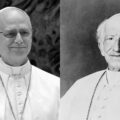It begins by noting that working people may resort to striking because of their working conditions and, because strikes are injurious to the public and may create violence and disorder, the state may act to remedy working conditions. (39)
The document immediately moves on to matters of the soul. It is stated that our final purpose is not life on earth. Nobody is entitled to harm the dignity that God gives us or stand in the way of the “higher life” which is our path to heaven. (40) As such, all must have the opportunity to rest from labour and practise religious observances on Sundays and holy days of obligation. (41) We need to rest from the business of everyday life to turn our thoughts heavenwards. God taught the world by “His own mysterious rest” the need to rest on the Sabbath day.
Employers are then told that working men must not be mere instruments of money-making. Men’s minds should not be “stupefied” nor their bodies “worn out”. Daily labour should not require longer hours than strength permits, and the hours of work should depend on the type of work and season of the year. Woman and children should only do work that is appropriate for them – “rough weather spoils the buds of spring and life’s hard toil blights a child and renders true education impossible.” It is stated that a woman is by nature fitted for home work “and it is that which is best adapted at once to preserve her modesty and promote the good bringing up of children and the well-being of the family.” (42)
Just wages
The next topic is described as being of great importance and one where extremes are to be avoided. One such extreme is that any agreement by free consent is sufficient, and that the public authorities should only intervene when the employer withholds wages or the work is not entirely done. (43)
The argument for a different approach and for a living wage is then laid out. Work is personal and, insofar as it is personal, a man can accept any wage he wants. However, man cannot live without labour and the proceeds from it. The poor can only get what they need through work. The preservation of life is the duty of all, and all have a natural right to procure what they need to live. Natural justice therefore demands that wages ought to be sufficient to support a frugal and well-behaved wage-earner. If, through necessity or fear, the employee accepts worse conditions, he is the victim of force or injustice. The idea of a free wage agreement is not objectionable in principle. However, if it is necessary, “societies or boards” should bring about the conditions for a just wage to prevent “undue interference” on behalf of the state. The state should be appealed to only should circumstances require. (45)
A workman, after looking after his family, should practise thrift. This point was closely connected to the importance of private ownership and will lead to the following beneficial results:
- Property will become more equitably divided
- If poorer people can look forward to having property, the classes will be brought closer to each other
- Men will work harder for what they can own, and this will add to the wealth of the community
- People are less likely to want to emigrate
But, the document states, these benefits can only be realised if a family’s means are not drained by taxation. The state would be unjust and cruel if through taxation it were to deprive the owner of more than is fair. (47)
Organisations for the provision of welfare
Rerum novarum then goes on to discuss how employers and workers may better the conditions of workers and draw the classes closer together if they form associations of mutual aid to help those in distress – including to help widows, orphans, those who fall prey to a sudden calamity or sickness, and institutions for the welfare of boys, girls and the old. (48)
Of such organisations, unions were stated to be the most important. Scripture is used to support the idea that if two or more are together they can support each other. (50) Unions, it is noted, are private societies carrying out private objects (St. Thomas is referred to). They therefore cannot be prohibited by the state because entering into a society is a natural right: this is also a theme of Centesimus annus. If a state prevents its citizens from forming associations, it contradicts the principle of its own existence which is based on the natural tendency of man to dwell in society.
Religious orders, confraternities and societies have also done much good. The rulers of the state have no rights over them, nor can they claim any share in their control. The state should respect, cherish and defend such organisations: it is to be regretted that secular states are attacking such communities. (53)
Pope Leo then expresses concern that associations are being set up that are trying to attract working men but the principles of which are not in accordance with Christianity. (54) He argues that this creates a dilemma. Either working men must join them, thereby exposing their religion to peril, or they must form their own associations. Pope Leo strongly recommends the second approach: there should be Christian unions and Christian working men’s associations. Clergy should provide for the spiritual needs of such organisations. The benevolence of Catholics who have sponsored benefit and insurance societies financially was also praised. The state should watch over such societies but should not involve itself in their organisation: “Things move and live by the spirit inspiring them, and may be killed by the rough grasp of a hand from without.” (55)
In summary, organisations of working men should be designed to better the condition of body and soul, and they must pay special attention to the duties of religion and morality whilst promoting social betterment. We are reminded “What doth it profit a man, if he gain the whole world and suffer the loss of his soul.” (57) Our associations “should look first and before all things to God”: they should include religious instruction. They should involve co-operation between employers and employees and provide support for accident, sickness, old age and distress. Associations should help people to be hard-working, industrious and bound together in brotherly love. (57)
The importance of Catholic associations of working men was stressed at great length. Working men should join associations and choose wise guides. And we must bring back those working men who have lost their faith altogether or whose lives are at variance with its precepts. They are likely to resent their employers mistreating them and, if they belong to a union, it is likely to be one that is based on conflict and not one sustained by religion. Catholic associations are of great value in reaching out to such people.
Pope Leo ends by stating that each person should do that task which falls to him before the evil at hand grows to be beyond remedy. (62)
For her part, the Church will intervene with greater effect if her freedom of action is not restrained. Ministers of religion must urge the adoption of “Gospel doctrines”, strive to secure the good of the people and promote Christian charity amongst all people as the best antidote against worldly pride. 63)
Concluding remarks
This trilogy has simply recounted the content of Rerum novarum with little analysis. However, as a final remark, it is worth pointing out that the document makes no sense unless it is regarded as a radical call to sanctify all aspects of working, civil and political life and to ensure that work and economic life provide the material conditions which help all people reach salvation. Indeed, there is a strong attack on secular institutions such as secular trade unions. Salvation and our duties to God are at the centre of Rerum novarum, and the document should not be read as a set of political proposals to be translated, somehow, into the modern day: without the grace of God, we will fail.
—







